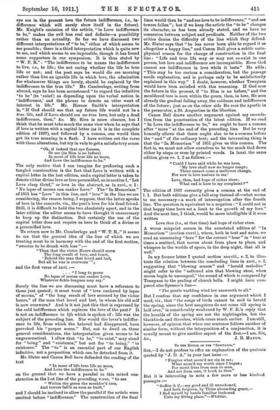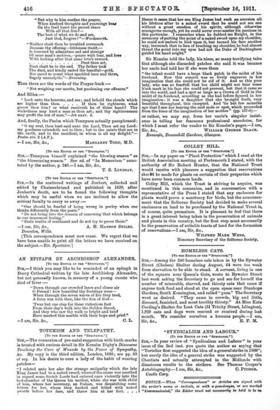To TICE EDITOR OP THE "SPECTATOR.'
do not profess to offer an explanation of the quatrain quoted by " J. D. A." in your last issue :- " Forgive what seem'd my sin in me;
What seem'd my worth since I began ; For merit lives from man to man, And not from man, 0 Lord, to thee."
But it is interesting to note a few more or less kindred passages :— " Suffice it if,—my good and ill nnreckoned, And both forgiven, by Thine abounding grace,— I find myself by hands familiar beckoned Unto my fitting place:'—Whittier. "But why to him confine the prayer, When kindred thoughts and yearnings bear On the frail heart the purest share With all that live ?— The best of what we do and are,
Just God, forgive I "—Wordsworth.
"Neither shalt thou be troubled overmuch Because thy offering—littleness itself,— Is lessened by admixture sad and strange
Of mere man's motives,—praise with fear, and love
With looking after that same love's reward.
Dust thou art, Dust shalt be to the end. Thy father took The dust, and kindly called the handful—gold, Nor cared to count what sparkled here and there, Sagely unanalytic."—Browning.
Then there are the words of the Prayer-book :—
" Not weighing our merits, but pardoning our offences." And Elihn :— " Look unto the heavens, and see; and behold the clouds which
are higher than thou If thou be righteous, what givest thou him? or what receiveth ho of thine hand? Thy wickedness may hurt a man as thou art; and thy righteousness may profit the son of man."—Job xxxv. 5.
And, finally, the Psalm which Tennyson actually paraphrased : " 0 my soul, thou halt said unto the Lord, Thou art my Lord : my goodness extendeth not to thee; but to the saints that are in the earth, and to the excellent, in whom is all my delight"— Psalm xvi. 2 (A.V.).











































 Previous page
Previous page